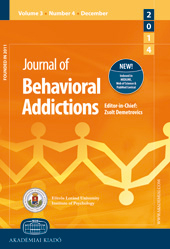Motivational and psychological correlates of bodybuilding dependence
Motivational and psychological correlates of bodybuilding dependence
Author(s): Neim N. Emini, Malcolm J. BondSubject(s): Psychology, Behaviorism, Studies in violence and power, Health and medicine and law, Sports Studies
Published by: Akadémiai Kiadó
Keywords: stress; anger; hostility; aggression;
Summary/Abstract: Exercise may become physically and psychologically maladaptive if taken to extremes. One example is the dependence reported by some individuals who engage in weight training. The current study explored potential psychological, motivational, emotional and behavioural concomitants of bodybuilding dependence, with a particular focus on motives for weight training. Using a path analysis paradigm, putative causal models sought to explain associations among key study variables. Methods: A convenience sample of 101 men aged between 18 and 67 years was assembled from gymnasia in Adelaide, South Australia. Active weight trainers voluntarily completed a questionnaire that included measures of bodybuilding dependence (social dependency, training dependency, and mastery), anger, hostility and aggression, stress and motivations for weight training. Results: Three motives for weight training were identified: mood control, physique anxiety and personal challenge. Of these, personal challenge and mood control were the most directly salient to dependence. Social dependency was particularly relevant to personal challenge, whereas training dependency was associated with both personal challenge and mood control. Mastery demonstrated a direct link with physique anxiety, thus reflecting a unique component of exercise dependence. Conclusions: While it was not possible to determine causality with the available data, the joint roles of variables that influence, or are influenced by, bodybuilding dependence are identified. Results highlight unique motivations for bodybuilding and suggest that dependence could be a result of, and way of coping with, stress manifesting as aggression. A potential framework for future research is provided through the demonstration of plausible causal linkages among these variables.
Journal: Journal of Behavioral Addictions
- Issue Year: 3/2014
- Issue No: 3
- Page Range: 182-188
- Page Count: 7
- Language: English

